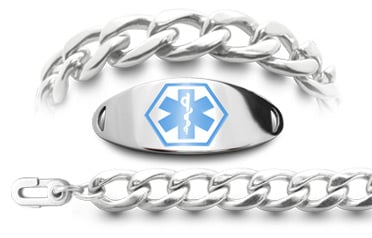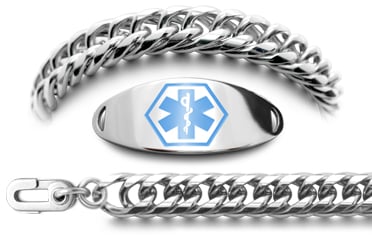Unremovable Alzheimer's clasps are safer
Tag example:
ON BLOOD THIN
PACEMAKER-NO MRI
FORGETFUL
ICE8880000000
Less embarrassing ways to label ID Tag’s for early stage memory problems with softer, more respectful wording such as:
See Abbreviations
List critical medical issues: Blood Thinners, "PACEMAKER", "AFIB", "DIABETES" and more. See Med Terms
Put bracelet on the “writing hand” so the more difficult-to-handle patients will find it harder to remove by themselves.
Exclusive non-removable Alzheimers clasp design
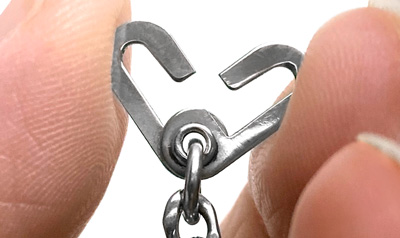
How to Close the Unremovable Clasp. Closing the clasp is easy if you understand how this exclusive sisterhook system works. Basically, all you need to do is pass one side of the two sisterhook arms through the plate opening at one end, and then squeeze the two ends closed. Just make sure they're completely overlapped. To see how this is done, please see this How-to-Page.
Plan "B" Bracelet Design for Extreme Patients

How best to deal with Alzheimer's & Dementia
Get a bracelet early so they understand why they need the bracelet, and they'll be less inclined to remove it later on.
Get one they'll like to wear. It may help to have them participate to feel included in their own care. Doing everything for them can make them feel more helpless.
Measure wrists carefully so the fit is perfect and snug, but still comfortable. In later stages, they're more likely to pull it off if the bracelet is uncomfortable.
If too loose—dementia bracelets are too easily pulled off without our unremovable design that electronic bracelets can't match.
Free ID tag and engraving with unremovable sets
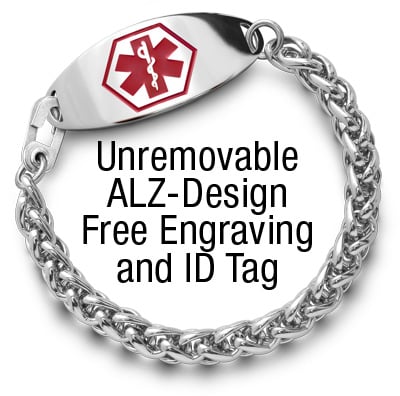
Save on ALZ-Sets which include...
bracelet and Free tag and engraving. Virtually non-removable unique clasp design and construction keeps loved ones safer than any ordinary medical bracelets.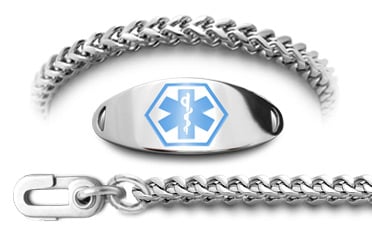
Early diagnosis of Alzheimer’s is important
• A better chance of benefiting from treatment
What You Need to Know: Alzheimer’s & Dementia
Dementia
Dementia is the umbrella term that encompasses impairment of memory and/or thought processes enough to interfere with every day activity. It is a general term often used to describe a set of symptoms associated with a decline in memory processing meaning that the term “dementia” is not in and of itself an illness. Though, it can be caused by a number of underlying problems such as Blood Flow problems to the brain, Huntington’s disease or Parkinson’s disease.
Alzheimer’s
Age-Related Memory Loss
This is not uncommon when growing older. But sometimes it can be hard to distinguish between “normal” memory loss and dementia. Examples of normal behavior for someone who is experiencing age-related memory loss would be making a poor decision every once and a while, missing bill payments, forgetting what day it is and recalling later, forgetting a word they want to use in speech, or losing things.
Behavior to be concerned about would be an inability to manage their finances, losing track of the month or season, difficulty carrying on a conversation, poor judgment skills, and misplacing items without being able to retrace their steps.
Changes in personality like becoming depressed or irritable when those individuals haven’t been that way before, can be an initial indicator of something more serious.
Exclusive unremovable ALZ clasp design
Includes bracelet and AirTag® holding-case as shown. AirTag® inside not included. Apple® iOS 14.5 or later. For more info.
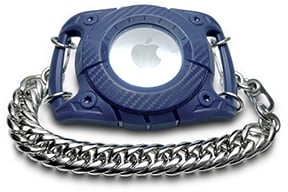
Unremovable GPS Conversions. Make your existing GPS or RFID watch style pendant into an unremovable bracelet. This is for tracking people with Alzheimer's, Dementia and Autism. Note: we do not provide the GPS device, we only convert your existing GPS if it's similar to the one shown here.
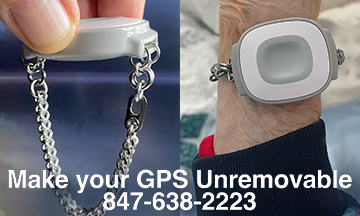
Paramedics look to the wrists first
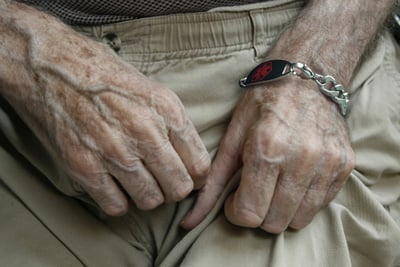
With only seconds to save a life, doctors and paramedics have no time for phone calls in a real "medical emergency". They must decide quickly what can and cannot be done on the spot. Only in "non-medical emergencies" will the police make calls.
Must be worn 24/7 and withstand water conditions such as chlorine or salt water. This means a stainless steel medical bracelet is the best choice. Avoid beaded bracelets for memory impaired patients.
If you are the “ICE” number recipient, make sure you have a Med info card that lists all medical issues for loved ones, so when called, you can provide useful help.
What you need for DNR: Most states will not accept a “DNR” from an ID tag without special paperwork or registration back-up. Check with local paramedics and hospitals for what is needed to honor a “Do Not Resuscitate” request.
There are five stages of progression
Once they are past this stage, they will continue into Moderate and Severe Dementia due to Alzheimer’s. At this point they will:
Once the later stages set in, it’s not uncommon for loved ones to lose their sense of self.
When ALZ and Dementia require legal help
If you are having legal problems with your family members or the caregiver concerning your loved one with Alzheimer's or Dementia, please read this helpful guide by a notable attorney. You may avoid some serious problems if you are not protecting your Mom, Dad and perhaps yourself. See ALZ Legal Help


